Social eating: Nourish your mind with the right foods & people
filter
Sharing a meal has always been more than just satisfying hunger- it's about connection, conversation, and community. Recent scientific research has begun to uncover the profound ways in which both your social environments and dietary choices influence your mental wellbeing. The interplay between who you eat with and what you eat creates a powerful formula for holistic health management. This article explores how social eating is linked to nutrition and mental health to support your brain chemistry.
What are the mental benefits of socialising?
The mental benefits of socialising extend far beyond simple enjoyment. Science has revealed that social interaction triggers profound neurochemical responses that directly influence your emotional state and mental resilience. At the neuronal level, social interaction activates the release of oxytocin, often called the "bonding hormone." Research has shown that oxytocin plays a crucial role in social behaviour by directly modulating how the brain works, especially in areas associated with mood regulation and social processing[1 Trusted Source 2022 - Journal of Comparative Neurology Animal study Oxytocin receptors are widely distributed in the prairie vole (Microtus ochrogaster) brain: Relation to social behavior, genetic polymorphisms, and the dopamine system ] , which reduces stress and promotes emotional stability[2 Trusted Source 2024 - Translational Psychiatry Animal study Social interaction-induced fear memory reduction: exploring the influence of dopamine and oxytocin receptors on memory updating ] . Oxytocin works together with your reward and pleasure chemical dopamine to support social connection[3 Trusted Source 2024 - Nature Human Behaviour Human study Dopamine and serotonin in human substantia nigra track social context and value signals during economic exchange ] . A 2024 review highlighted that oxytocin and dopamine are released in response to social interaction, eating, and physical touch, and they affect each other's release and receptors[4 Trusted Source 2024 - Biomedicines Research evaluation Interactions of Oxytocin and Dopamine—Effects on Behavior in Health and Disease ] . This interaction helps explain why positive social experiences feel rewarding and motivate you to seek further connection. Oxytocin helps people work together by making them kinder, less selfish, more connected, and more in sync with others[5 Trusted Source 2024 - The Neuroscientist Research evaluation Oxytocin in Human Social Network Cooperation ] . Throughout evolution, eating has usually been a social activity. Let’s take a look at why that is.
What is the meaning of social eating?
Social eating refers to the practice of having meals in the company of others, whether family members, friends, or even remote connections through technology. It represents one of humanity's most fundamental shared experiences, dating back to early human societies, where group meals reinforced social bonds and collective survival[6 Trusted Source 2023 - Applied Psychology: Health and Well-Being Human study Alone but together: Cloud-based commensality benefits physical and mental health ] ,[7 Trusted Source 2023 - Clinical Nutrition Human study Are family meals and social eating behaviour associated with depression, anxiety, and stress in adolescents? The EHDLA study ] . At its core, social eating is a multisensory experience. The act of passing dishes, making eye contact, and engaging in conversation activates brain regions linked to reward and emotional processing[3 Trusted Source 2024 - Nature Human Behaviour Human study Dopamine and serotonin in human substantia nigra track social context and value signals during economic exchange ] . For example, sharing a meal with loved ones triggers the release of oxytocin, a hormone associated with trust and bonding[2 Trusted Source 2024 - Translational Psychiatry Animal study Social interaction-induced fear memory reduction: exploring the influence of dopamine and oxytocin receptors on memory updating ] . Social eating behaviour studied in adolescents hypothesised a connection between socialising over food and emotional well-being. A cross-sectional study from Spain also suggested that higher social eating behaviour is associated with lower probabilities of experiencing depressive, anxiety, and stress symptoms in teenagers[7 Trusted Source 2023 - Clinical Nutrition Human study Are family meals and social eating behaviour associated with depression, anxiety, and stress in adolescents? The EHDLA study ] . The results from the study showed that each additional point on the scale of social eating behaviour decreased the probability of having more depressive symptoms by 17%, anxiety symptoms by 12%, and stress symptoms by 10%[7 Trusted Source 2023 - Clinical Nutrition Human study Are family meals and social eating behaviour associated with depression, anxiety, and stress in adolescents? The EHDLA study ] . Researchers hypothesised that this might be the result of an increased sense of belonging, promoting secure family relationships.
With changing lifestyles, this tradition has evolved and now also includes virtual "cloud-based" meals, where people dine together via video calls[6 Trusted Source 2023 - Applied Psychology: Health and Well-Being Human study Alone but together: Cloud-based commensality benefits physical and mental health ] . A groundbreaking study published in 2023 investigated whether this modern form of social eating could positively affect physical and mental health[6 Trusted Source 2023 - Applied Psychology: Health and Well-Being Human study Alone but together: Cloud-based commensality benefits physical and mental health ] . The researchers conducted two experiments: one examining participants' expectations about eating socially versus alone, and another studying romantic couples having meals together in different scenarios. When social eating, participants made healthier food choices, reducing meat consumption, and the researchers also hypothesised that virtual socialising over food might have some emotional benefits, like alleviating feelings of loneliness, promoting emotional well-being, and enhancing relationship quality for couples. They suggested these benefits can persist during quarantine periods or normal times[6 Trusted Source 2023 - Applied Psychology: Health and Well-Being Human study Alone but together: Cloud-based commensality benefits physical and mental health ] .
While the setting in which you eat is important, what you eat is crucial.
What foods are good for mental health?
From protein-rich foods to healthy fats, all of these can support the production of important building blocks in the brain that are involved in your well-being. Several dietary patterns and specific foods have demonstrated positive effects on mental health. The Mediterranean diet stands out as particularly beneficial for mental well-being. How does nutrition affect mental health? A systematic review published in 2018 investigated the relationship between Mediterranean diet adherence and mental health outcomes in adults. Among the 41 studies, a 33% reduction in depression risk among those with the highest Mediterranean diet adherence was suggested[8 Trusted Source 2019 - Molecular Psychiatry Systematic and meta-analysis Healthy dietary indices and risk of depressive outcomes: a systematic review and meta-analysis of observational studies ] . While results are promising, the Mediterranean diet is yet to be recommended by the NHS as a formal treatment for depression. Read more about the foods for brain health in the Mediterranean diet to understand the link.
Specific foods may also offer mental health benefits. Bananas, for instance, contain high levels of tryptophan, the building block of your feel-good chemical serotonin. A comprehensive review examined the link between banana consumption and mood, suggesting that bananas demonstrated some antidepressant and antianxiety properties in experimental trials[9 Trusted Source 2025 - Indonesian Journal of Pharmacy Research evaluation Exploring the Mood-Boosting Potential of Bananas: A Comprehensive Review ] , though more research is needed. Let’s take a look at other foods that are good for your brain, acting as building blocks that help support your brain structure and chemicals.
The neuroscience behind food: 4 building blocks for your brain
Certain nutrients directly influence the production and function of your brain chemicals. Here are some of the best foods for brain function to include next time you’re gathered around the table.
5-HTP: The serotonin stabiliser
A nutrient present in certain types of mushrooms, Brazilian honey and Griffonia seeds, called 5-htp, supports the production of your feel-good chemical serotonin. Serotonin is a brain chemical, important for mood regulation[10 Trusted Source 2021 - International Journal of Molecular Sciences Research evaluation Serotonin—Its Synthesis and Roles in the Healthy and the Critically Ill ] , as low serotonin levels are linked to anxiety and depression. To get an adequate intake of 5-htp from natural 5-htp sources would be almost impossible.
|
5-htp in 100g of source (in mg) |
The amount of ingested source to reach 100mg of 5-htp |
|
|
White bottom mushroom |
<0.001 |
100 kg |
|
Honey mushroom |
<0.001 |
100 kg |
|
King bolete mushroom |
0.18 |
55 kg |
|
Brazilian honey |
2 |
5 kg |
High amounts of those natural sources, which you’d need to get 100mg of 5-htp daily, contain other compounds which can be toxic when ingested in large amounts. If you’re searching to stabilise your serotonin levels quicker, brain feed developed 5-HTP 100mg tablets that contain 99% 5-HTP, making it the smallest and nutrient-dense 5-HTP supplement available.
While 5-htp foods and supplements can increase the serotonin in your body, they’re most effective when paired with social support, which releases serotonin.
Tyrosine: The dopamine kick
A nutrient found in protein-rich foods like tofu, cheese and lean meats, tyrosine, is the building block for your reward and pleasure chemical dopamine. Dopamine drives motivation, focus, and the ability to experience pleasure[3 Trusted Source 2024 - Nature Human Behaviour Human study Dopamine and serotonin in human substantia nigra track social context and value signals during economic exchange ] ,[11 Trusted Source 2019 - Psychological Research Human study Food for thought: association between dietary tyrosine and cognitive performance in younger and older adults ] . In social settings, tyrosine-rich foods will enhance the release of dopamine, enhancing the rewarding aspects of interaction, making conversations feel more engaging. Let’s take a look at what food to add to your menu to increase your tyrosine intake.
|
Tyrosine content (in mg per 100g of food) |
|
|
Parmesan cheese |
2300 |
|
Frozen dried tofu |
1800 |
|
Beef steak |
1200 |
If you’re looking for a quick kick in your dopamine levels, brain feed developed the world's 1st 800mg natural tyrosine capsules from fermented corn.
Alpha GPC: Your work enhancer
Your memory and learning chemical, acetylcholine is made from choline[12 Trusted Source 2019 - The American Journal of Clinical Nutrition Research evaluation Choline and phosphatidylcholine may maintain cognitive performance by multiple mechanisms ] ,[13 Trusted Source 2023 - Frontiers in Endocrinology Research evaluation Choline supplements: An update ] . A very potent form of choline, Alpha GPC, is found in eggs, specifically egg yolks[14 Trusted Source 2023 - Lipids in Health and Disease Human study Effects of egg yolk choline intake on cognitive functions and plasma choline levels in healthy middle-aged and older Japanese: a randomized double-blinded placebo-controlled parallel-group study ] . There’s about 300mg of egg choline in egg yolk, however, the exact amount of Alpha GPC is still unknown. brain feed developed the world’s 1st 500mg Alpha GPC capsules containing 99% Alpha GPC.
For when you are back at your desk, Alpha GPC can help you stay ready for switching between work tasks effectively and boosting your work performance.
Omega 3s: for brain development and function
A specific omega 3 fat called DHA, found in fatty fish, supports the brain’s ability to rewire itself, a process called neuroplasticity[15 Trusted Source 2015 - Prostaglandins, Leukotrienes and Essential Fatty Acids Research evaluation The benefit of docosahexaenoic acid for the adult brain in aging and dementia ] . While your body responds to DHA in the long run, these healthy fats can still support you in social situations by keeping your brain sharp. Since another healthy fat, ALA[16 Trusted Source 2015 - Progress in Lipid Research Research evaluation Is docosahexaenoic acid synthesis from α-linolenic acid sufficient to supply the adult brain? ] , can convert to DHA in your body, here are some of the foods that can help you increase your levels.
|
DHA (mg in 100g of food) |
|
|
Flaxseed oil (ALA) |
approx. 2100 |
|
Flax seeds (ALA) |
approx. 800 |
|
Cooked Atlantic Salmon |
1500 |
When opting for fish, make sure you opt for sustainably farmed or fished ones.
If you want to get DHA from the original source, brain feed developed a double-concentrated DHA supplement derived from algae. It contains 550mg DHA in a single plant-based omega 3 capsule.
To find out more about their mechanism, explore how to improve mental wellbeing with your brain chemicals.
Combining social interaction with nutrient-dense foods creates a feedback loop that amplifies their individual benefits. Next time it’s time for a Sunday roast, divide cooking tasks between family or friends and collaboratively prepare a meal that’s filled with nutrient-dense foods.
References
[1] Inoue, K., Ford, C. L., Horie, K., & Young, L. J. (2022). Oxytocin receptors are widely distributed in the prairie vole (Microtus ochrogaster) brain: Relation to social behavior, genetic polymorphisms, and the dopamine system. Journal of Comparative Neurology, 530(16), 2881–2900. https://onlinelibrary.wiley.com/doi/10.1002/cne.25382
[2] Arellano Perez, A. D., Kautzmann, A. S., & de Oliveira Alvares, L. (2024). Social interaction-induced fear memory reduction: Exploring the influence of dopamine and oxytocin receptors on memory updating. Translational Psychiatry, 14(1), 1–10. https://www.nature.com/articles/s41398-024-02955-3
[3] Batten, S. R., Bang, D., Kopell, B. H., Davis, A. N., Heflin, M., Fu, Q., Perl, O., Ziafat, K., Hashemi, A., Saez, I., Barbosa, L. S., Twomey, T., Lohrenz, T., White, J. P., Dayan, P., Charney, A. W., Figee, M., Mayberg, H. S., Kishida, K. T., … Montague, P. R. (2024). Dopamine and serotonin in human substantia nigra track social context and value signals during economic exchange. Nature Human Behaviour, 8(4), 718–728. https://www.nature.com/articles/s41562-024-01831-w
[4] Petersson, M., & Uvnäs-Moberg, K. (2024). Interactions of Oxytocin and Dopamine—Effects on Behavior in Health and Disease. Biomedicines, 12(11), Article 11. https://www.mdpi.com/2227-9059/12/11/2440
[5] Han, X., & Ma, Y. (2024). Oxytocin in Human Social Network Cooperation. The Neuroscientist, 10738584241293366. https://journals.sagepub.com/doi/10.1177/10738584241293366
[6] Wang, C., & Wan, X. (2023). Alone but together: Cloud-based commensality benefits physical and mental health. Applied Psychology: Health and Well-Being, 15(4), 1490–1506. https://iaap-journals.onlinelibrary.wiley.com/doi/10.1111/aphw.12448
[7] Victoria-Montesinos, D., Jiménez-López, E., Mesas, A. E., López-Bueno, R., Garrido-Miguel, M., Gutiérrez-Espinoza, H., Smith, L., & López-Gil, J. F. (2023). Are family meals and social eating behaviour associated with depression, anxiety, and stress in adolescents? The EHDLA study. Clinical Nutrition, 42(4), 505–510. https://www.clinicalnutritionjournal.com/article/S0261-5614(23)00029-8/fulltext
[8] Lassale, C., Batty, G. D., Baghdadli, A., Jacka, F., Sánchez-Villegas, A., Kivimäki, M., & Akbaraly, T. (2019). Healthy dietary indices and risk of depressive outcomes: A systematic review and meta-analysis of observational studies. Molecular Psychiatry, 24(7), 965–986. https://www.nature.com/articles/s41380-018-0237-8
[9] Soeliono, I., Puspitasari, I., Gani, A. P., & Hadisoewignyo, L. (2025). Exploring the Mood-Boosting Potential of Bananas: A Comprehensive Review. Indonesian Journal of Pharmacy, 1–19. https://jurnal.ugm.ac.id/v3/IJP/article/view/9037
[10] Kanova, M., & Kohout, P. (2021). Serotonin—Its Synthesis and Roles in the Healthy and the Critically Ill. International Journal of Molecular Sciences, 22(9), Article 9. https://www.mdpi.com/1422-0067/22/9/4837
[11] Kühn, S., Düzel, S., Colzato, L., Norman, K., Gallinat, J., Brandmaier, A. M., Lindenberger, U., & Widaman, K. F. (2019). Food for thought: Association between dietary tyrosine and cognitive performance in younger and older adults. Psychological Research, 83(6), 1097–1106. https://link.springer.com/article/10.1007/s00426-017-0957-4
[12] Shea, T. B. (2019). Choline and phosphatidylcholine may maintain cognitive performance by multiple mechanisms. The American Journal of Clinical Nutrition, 110(6), 1268–1269. https://ajcn.nutrition.org/article/S0002-9165%2822%2901320-X/fulltext
[13] Kansakar, U., Trimarco, V., Mone, P., Varzideh, F., Lombardi, A., & Santulli, G. (2023). Choline supplements: An update. Frontiers in Endocrinology, 14. https://www.frontiersin.org/articles/10.3389/fendo.2023.1148166
[14] Yamashita, S., Kawada, N., Wang, W., Susaki, K., Takeda, Y., Kimura, M., Iwama, Y., Miura, Y., Sugano, M., & Matsuoka, R. (2023). Effects of egg yolk choline intake on cognitive functions and plasma choline levels in healthy middle-aged and older Japanese: A randomized double-blinded placebo-controlled parallel-group study. Lipids in Health and Disease, 22(1), 75. https://lipidworld.biomedcentral.com/articles/10.1186/s12944-023-01844-w
[15] Salem, N., Vandal, M., & Calon, F. (2015). The benefit of docosahexaenoic acid for the adult brain in aging and dementia. Prostaglandins, Leukotrienes and Essential Fatty Acids, 92, 15–22. https://www.sciencedirect.com/science/article/pii/S0163782715000223
[16] Domenichiello, A. F., Kitson, A. P., & Bazinet, R. P. (2015). Is docosahexaenoic acid synthesis from α-linolenic acid sufficient to supply the adult brain? Progress in Lipid Research, 59, 54–66. https://doi.org/10.1016/j.plipres.2015.04.002


 alertness
alertness
 cognition
cognition
 sleep
sleep
 wellbeing
wellbeing

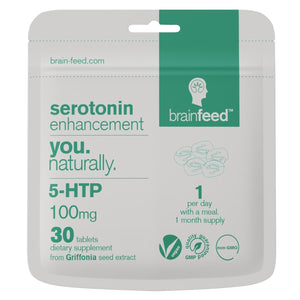

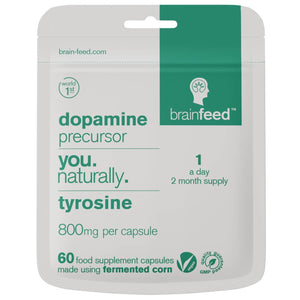

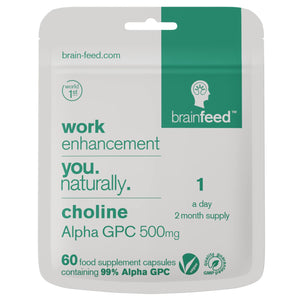
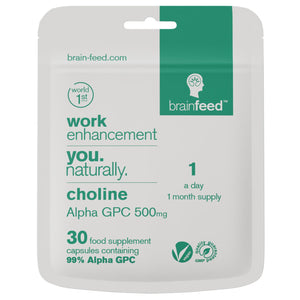

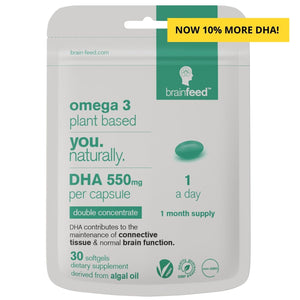
Leave a comment
Open tab